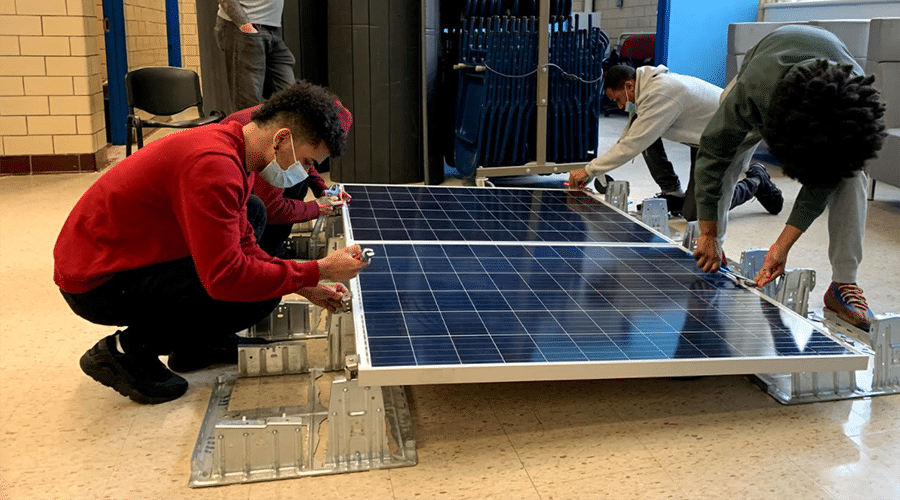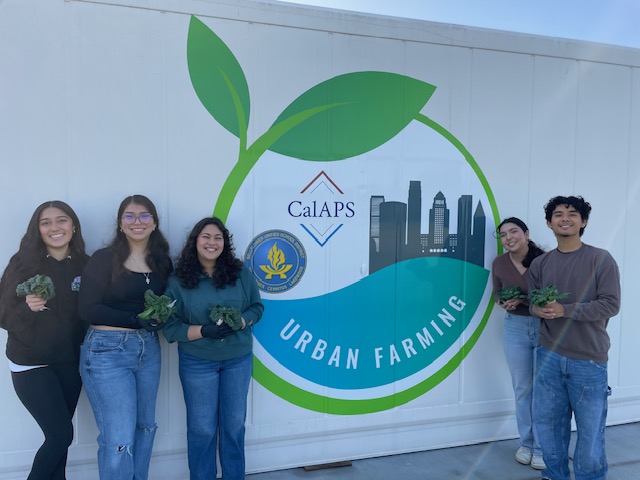The last fifty years have been marked by a growing conversation around the environment and climate. Today, we’ve reached a point where there is near global agreement that we must make the difficult shift from extractive economies to sustainable ones. This change will permeate every sector. Green skills will disrupt the world of work. From banking to business to healthcare, rapid and global adaptation to a changing environment will shift and shape life as we know it.
In a world where we can no longer predict the jobs of the next ten years, let alone the future, there is certainty in the need for green and sustainable jobs. Expert advice from organizations like the ILO, the OECD, and the Department of Labor clearly indicates the growing demand and urgency for this seismic shift in purpose and process.
While we are working to better embed high-quality project-based learning, real-world learning, and community-connected projects in K-12, we must also consider the ways in which we might point young people toward a more just, equitable, and regenerative future. This includes, but is not limited to, jobs that address and confront environmental justice and those that reimagine agriculture, community climate challenges, sustainable supply chains, and more. Schools have the power, and the responsibility, to play a guiding role in this work.
Why now?
Legislation like the Inflation Reduction Act (IRA) isn’t just about climate policy and incentivizing schools toward a cleaner future – it’s about jobs. A clean economy ensures more opportunity, more stability (e.g. clean manufacturing’s enhancements to global supply chains), and renewed energy security. This transition towards sustainability will produce millions of well-paid jobs that have the capacity to rejuvenate our towns, reduce inequality, and revitalize fading communities.
Billions of dollars are being invested to help our nation make this energy transition, but at the moment we can only hope that we will have the human resources necessary to meet the demand for solar panel installation, wind turbine building and repair, and infrastructure design and maintenance that will facilitate the transition to a greener economy.
Bill McKibben identified that “the two limiting factors of climate change will be whether we can overcome the fossil fuel industry’s meddling, and whether we can build out above all the human capital that we need.” He then said, “I mean, the best estimate is it’s going to take at least a million more electricians in the U.S. [alone]. If you know a young person who wants to do something that’s going to help the world and wants to make a good living at the same time, tell them to go become an electrician.”
Pullquote: “If you know a young person who wants to do something that’s going to help the world and wants to make a good living at the same time, tell them to go become an electrician.” – Bill McKibben
Planet ED, an initiative of the Aspen Institute, published a brief on school infrastructure and CTE, making a similar call to “Invest in career and technical education programs to increase access to clean energy jobs and to integrate environmental sustainability across career pathways” and to “invest in opportunity youth to ensure an equitable and just transition.”
YouScience found that “32% of students have an aptitude for careers in computers and technology, 30% for agriculture and natural resources, and 29% for advanced manufacturing.
However, despite their aptitudes for these key areas, students may not express a matching interest in pursuing these jobs. For instance, 75% more students have an aptitude for careers in computers and technology than interest, followed by 66% for advanced manufacturing, 48% for agriculture and natural resources and 43% for health science.”
Why Demand is Growing:
- Population Growth: With the global population expected to reach 9.7 billion by 2050, there is an increasing need for efficient and sustainable food production systems to ensure food security.
- Technological Advancements: Innovations such as precision agriculture, biotechnology, and automation are transforming farming practices, requiring a workforce skilled in these technologies.
- Sustainability and Climate Change: As climate change impacts agriculture, there is a growing need for professionals who can develop and implement sustainable farming practices to mitigate environmental impact and ensure resilience.
- Economic Importance: Agriculture remains a significant economic driver in many regions, creating a demand for skilled professionals to support and advance the industry.
Future Trends
- Precision Agriculture Specialists: Professionals who use technology such as GPS, sensors, and drones to optimize farming practices and increase efficiency.
- Agricultural Technologists: Professionals who work with advanced machinery and software to improve crop yields and farm management.
- Infrastructure Investment: Increased concentration on infrastructure spending will impact how food and water are transported both to and from the growing locations.
=The Agriculture Career Cluster concentrates on the scientific advancement, cultivation, processing, and distribution of agricultural products, employing advanced technologies and sustainable practices to optimize global food systems, as well as other plant and animal-based industries like regenerative agriculture, sustainable logging, and fisheries. This cluster significantly overlaps with the Energy and Natural Resources Cluster, highlighting a symbiotic relationship that emphasizes stewardship and resilient communities.
Agricultural Commerce
- Focuses on the economic aspects of agriculture, including consulting, financial analysis, and market management.
- Encompasses farm management, agricultural finance, supply chain management, and international relations.
- Key roles include farm managers and agricultural finance specialists who ensure profitability and sustainability in agriculture.
- Sample Programs of Study: Agribusiness, Agricultural Policy, Agricultural Finance.
Agricultural Technology & Automation:
- Intersection of agriculture and technology, focusing on automation, precision agriculture, and vertical farming.
- Includes innovative farming methods that improve efficiency, productivity, and sustainability.
- Sample Programs of Study: Agricultural Technology, Precision Agriculture, Urban Farming.
Animal Science:
- Promotes the health and well-being of animals, focusing on nutrition, breeding, and genetics.
- Involves optimizing production of meat, dairy, eggs, and other animal products and ensuring animal welfare.
- Sample Programs of Study: Animal Nutrition, Livestock Management, Veterinary Science.
Food Science & Processing
- Applies scientific and technological principles to food development, production, and processing.
- Ensures agricultural products like fruits, vegetables, and meat are safe, nutritious, and ready for consumption.
- Sample Programs of Study: Food Science, Food Safety, Sustainable Food & Farming.
Plant Systems
- Focuses on studying plant growth, pest management, and soil science to improve food production.
- Includes careers in agronomy, horticulture, forestry, and plant science aimed at enhancing crop yields and diversifying resources.
- Sample Programs of Study: Horticulture, Forestry, Plant Science.
Water Systems
- Manages the use of water resources in agriculture and aquaculture.
- Includes managing irrigation systems, optimizing water use, and supporting sustainable fish farming.
- Sample Programs of Study: Aquaculture, Marine Biology.
Entrepreneurial Opportunities and Future Roles
- Urban and Vertical Farming Specialist
- Hydroponic Specialist
- Drone operator
- Crop Geneticist
- Food Transporation and Preservation Entrepreneur
Credentials
- FFA Membership and Degrees: The National FFA Organization offers various degrees, such as the Greenhand Degree, Chapter Degree, State Degree, and American Degree, which recognize students’ accomplishments in agricultural education and leadership.
- 4-H Youth Development Program: Participating in 4-H programs provides students with hands-on experience in agriculture, leadership opportunities, and the ability to earn recognition and awards for their achievements.
- Agricultural Mechanics Certification: Certifications in agricultural mechanics, such as those offered by the National Institute for Automotive Service Excellence (ASE), validate skills in equipment repair and maintenance.
- Certified Crop Advisor (CCA) Certification: While typically aimed at post-secondary students and professionals, high school students can start working towards the prerequisites and gaining relevant experience for this certification, which demonstrates expertise in crop management.
- Pesticide Applicator Certification: Many states offer certification programs for pesticide applicators, which are essential for students interested in crop production and pest management.
- Animal Care Certification: Certifications from organizations like the Animal Care Training Program or the American Association for Laboratory Animal Science (AALAS) can validate skills in animal husbandry and care.




